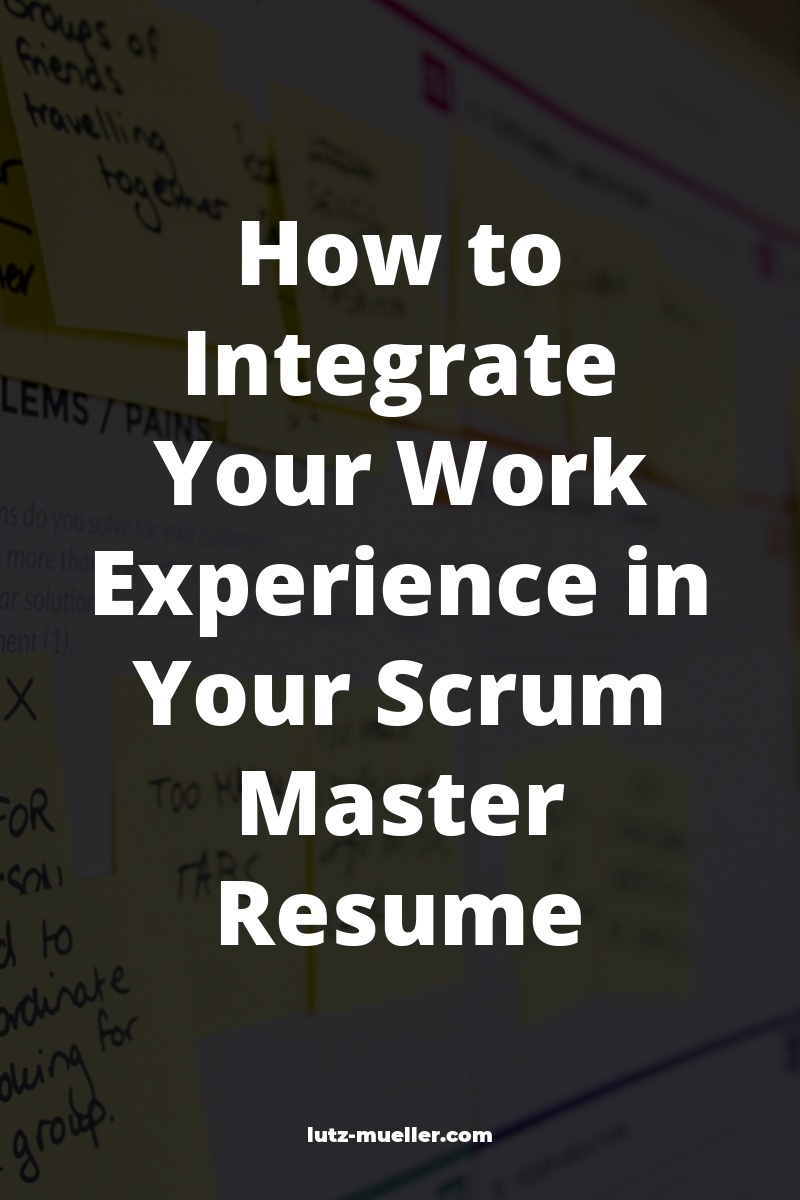Work experience is the bread and butter for getting hired as a Scrum Master. Most companies look for experienced Scrum Masters.
But does this mean you need to have worked with dozens of teams?
No!
The key to getting an interview for a Scrum Master position is to lay out your experience as a Scrum Master in a way, the recruiter and hiring manager understands what you have done in the past.
Follow these tips to simplify the review of your resume.
1. Work Experience Near the Top of the Page
The recruiter and hiring manager is interested in your work experience the most.
Add your current title, company, and past few years of your work experience near the top of the page.
Remember: The recruiter will scan your resume within 10-30 seconds. Your work experience needs to grab the recruiter’s attention to forward your resume to the next hiring funnel stage.
2. Certification Section
Companies looking for Scrum Masters value certifications a lot.
Next to work experience, it is one of the most crucial trust factors in your resume.
Everybody on the internet says certification does not matter that much. But companies still are looking for certificate candidates.
Let’s take a view from the hiring manager or recruiter:
Unless you get a referral from someone working for that company, you are a total stranger to them. They don’t know who you are, and they don’t know your skills. Besides, they don’t have considerable opportunities to test your skills.
If you are a developer, very often, you will get a coding challenge. At the end of the challenge, they can have a look at the code you produced. Companies can validate if a developer can write code professionally.
Something like this is not so easy for Scrum Masters. Their impact on the team and the organization is not easily measurable. So companies need other factors to identify if your skills fit the requirements. That is why a lot of companies require certificates in their job description.
Focus in this area on professional certifications like Certified Scrum Master (from Scrum Alliance) and Professional Scrum Master (from scrum.org).
Be wary of trivial-to-get certifications such as LinkedIn learning stuff. They are easy to get and contain a series of questions that can be repeated at any time.
3. Skills Section
List relevant skills here. Only list skills you are an expert or at least proficient at.
Do not add skills that are either not relevant to the job description or do not have a great experience. If you never facilitated a user story mapping workshop, don’t add this to your skill section.
A common mistake is to add all skills you ever heard of with a low self-assessed rating.
Another widespread mistake you need to avoid is listing standard tasks as a Scrum Master like, facilitating the Daily Scrum, Retrospective, etc.
If you transition from another role to the Scrum Master role, only list none-Scrum Master skills relevant to the job description.
What About IT/Development Skills?
Does a Scrum Master need to be able to develop software?
There are endless discussions about this topic on the internet. You will find people agreeing, and you will find people who say a Scrum Master does not need IT or development skills.
Truth is: What other people say does not matter.
It only matters what the hiring manager says.
Please do not argue with the recruiter about their requirements. If having IT skills is mandatory for a company, then there is no chance you can convince them to consider your Scrum Master resume even if you do not have those skills.
4. Use Sub-Work Sections
Did you spend a long time at one company?
If so, that does not mean you are inexperienced. You can gain a lot of experience as a Scrum Master, even if you stay in one company.
Treat each new team you worked with as a new sub-work section, especially if you worked with different agile environments: Scrum, Kanban, LeSS, SAFe.
5. Education Becomes Less Important
The more senior you are, the less important is your educational background in your resume.
If you have 1-3 years of experience as a Scrum Master, you can keep more details on your educational background.
But, if you are more senior and have five or more years under your belt, the recruiter is not interested in your educational background. It is OK only to add your degree with the graduation date.
6. Less Space on Old Positions
Remember: Your resume needs to sell you to the company.
For example, if you have more than ten years of experience, the recruiter is not interested in what you did eight years ago.
The recruiter and hiring manager want to know if you are a good fit now. Shorten old positions by removing unnecessary details.
7. Additional Publications
Add relevant publications and talks that could grab the recruiter’s attention.
Keep in mind that this needs to be outstanding. A speech at a well-known conference is more compelling than talking at your local agile meetup.
8. Interests
Add interests to make your resume more “human”. If your resume is already quite long you can skip this section.
Learn How to Write a Compelling Scrum Master Resume That Gets You Interviews
Over the next few weeks, I will write articles that will help you write a compelling resume without paying hundreds of dollars for professional writing services or resume templates.
Sign up below to get early access to new articles, guides, updates, and more. 👇

